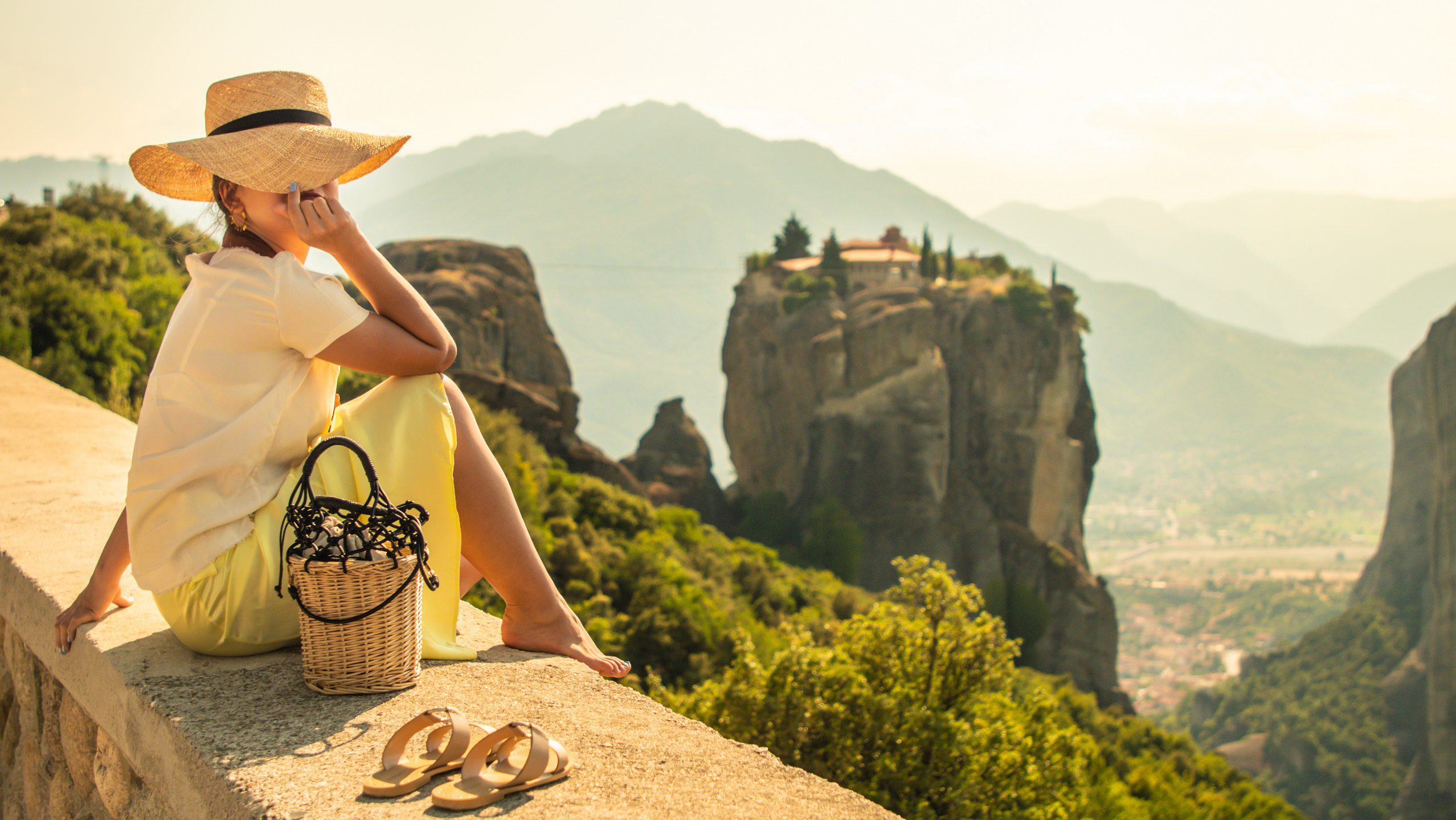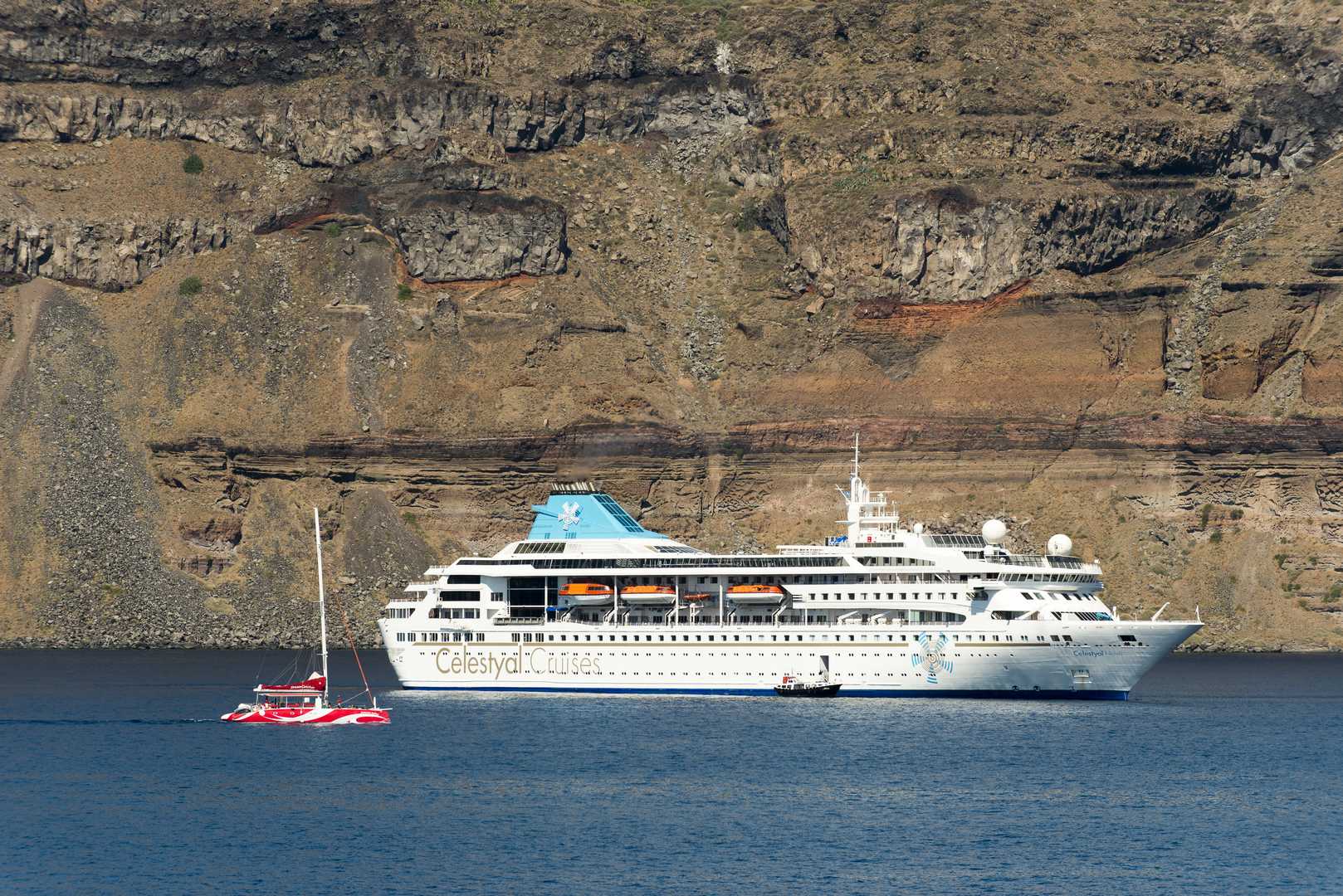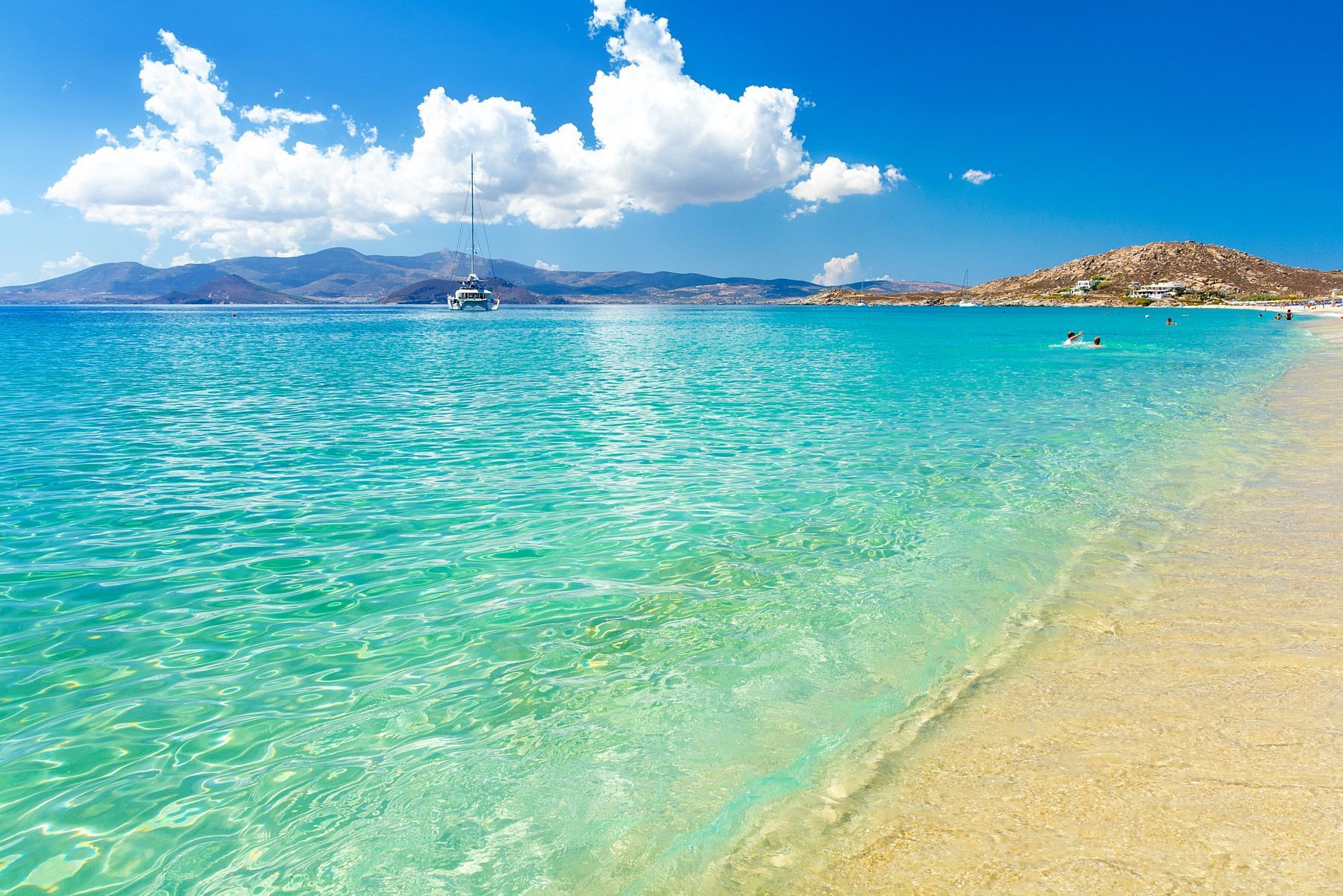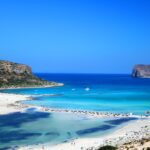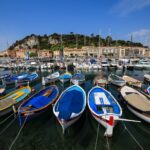Greece Cultural Events and Festivals
Introduction
Greece Cultural Events and Festivals – Predominantly rural, Greece is deeply attached to its locally produced food and wine, and chapels dotting the countryside serve as the focus for culinary, as well as religious, celebrations. Festivals of the Orthodox Church are deeply identified with Greekness, no more so than on 25 March, a date which commemorates both the Feast of the Annunciation and the start of the Independence uprising in 1821. Summer festivals are celebrated widely in rural villages, and expatriate Greeks return from across the globe. Organized arts events are a more recent phenomenon, paralleling the rise of tourism.
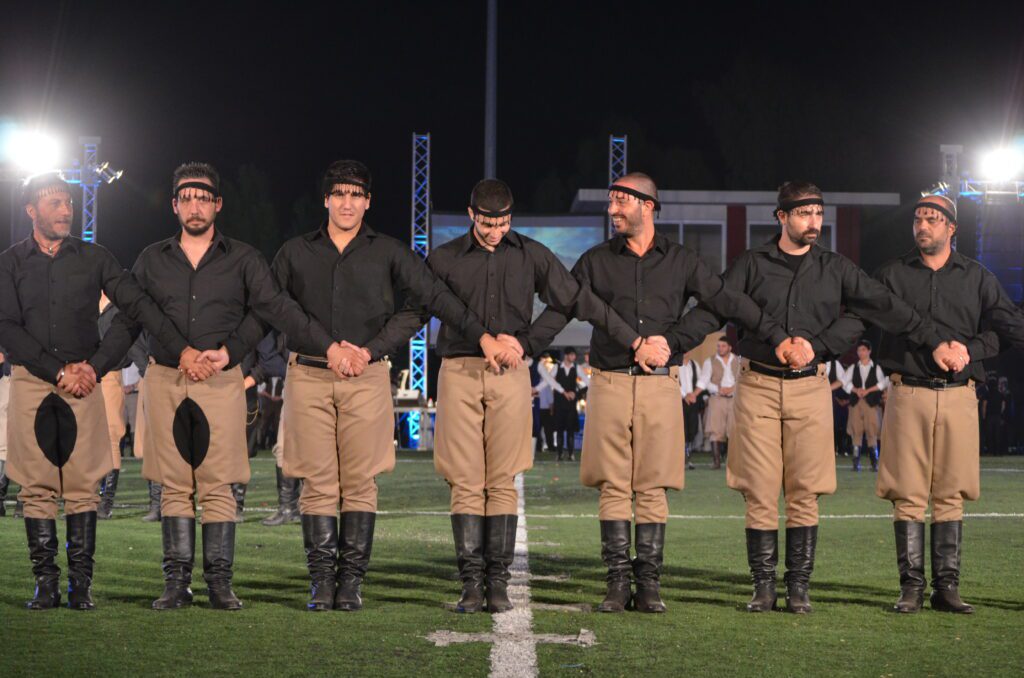
Name days
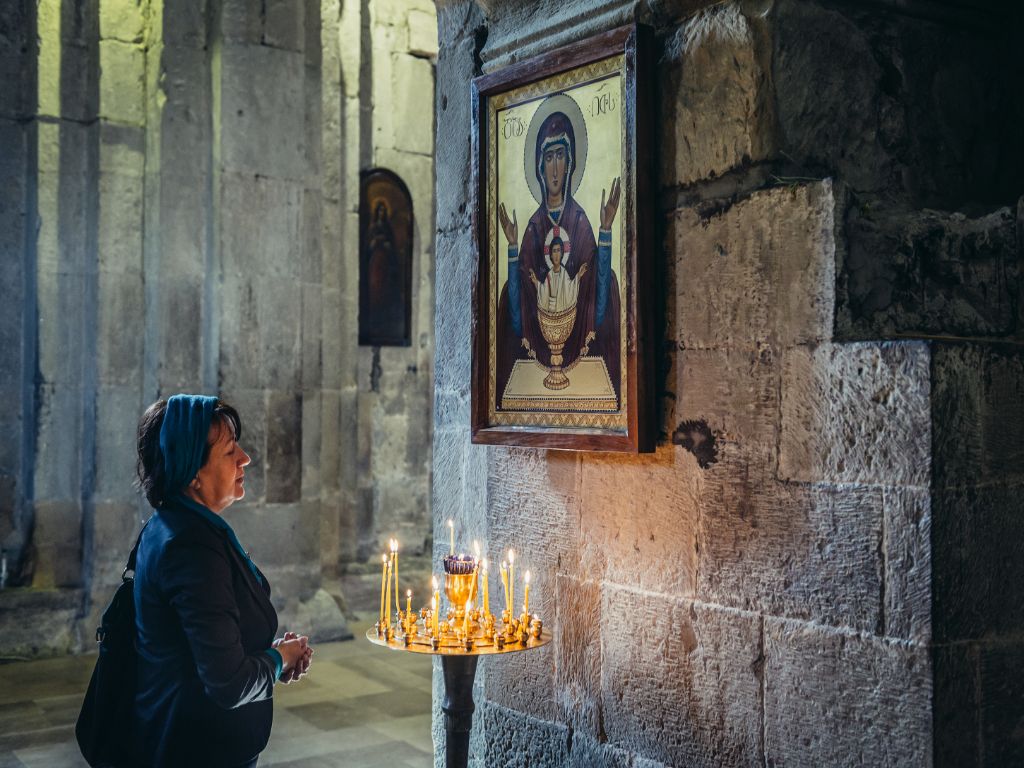
In Greece, everyone gets to celebrate their birthday twice. More important, in fact, than your actual birthday, is the “Name Day” of the saint who bears the same name. If your name isn’t covered, no problem – your party is on All Saints’ Day, eight weeks after Easter. If you learn that it’s an acquaintance’s name day, you wish them Khrónia Pollá (literally, “many years”). The big name day celebrations (Iannis/Ianna on January 7 or Yioryios on April 23 for example) can involve thousands of people. Any church or chapel bearing the saint’s name will mark the event – some smaller chapels will open just for this one day of the year – while if an entire village is named after the saint, you can almost guarantee a festival. To check out when your name day falls, see sfakia-crete.com.
Best of Turkey and Greece with 3-night cruise (With flight from USA – Small Group)
Easter
Easter is by far the most important festival of the Greek year. It is an excellent time to be in Greece, both for the beautiful and moving religious ceremonies and for the days of feasting and celebration which follow. If you make for a smallish village, you may well find yourself an honorary member for the period of the festival. The first great ceremony takes place on Good Friday evening as the Descent from the Cross is lamented in church. At dusk, the Epitáfios, Christ’s funeral bier, lavishly decorated by the women of the parish, leaves the sanctuary and is paraded solemnly through the streets. Late Saturday evening sees the climax in a majestic Mass to celebrate Christ’s triumphant return. At the stroke of midnight all the lights in each crowded church are extinguished and the congregation plunged into the darkness until the priest lights the candles of the worshippers, intoning “Dévte, lévete Fós” (“Come, take the Light”). The burning candles are carried home through the streets; they are said to bring good fortune to the house if they arrive still burning.
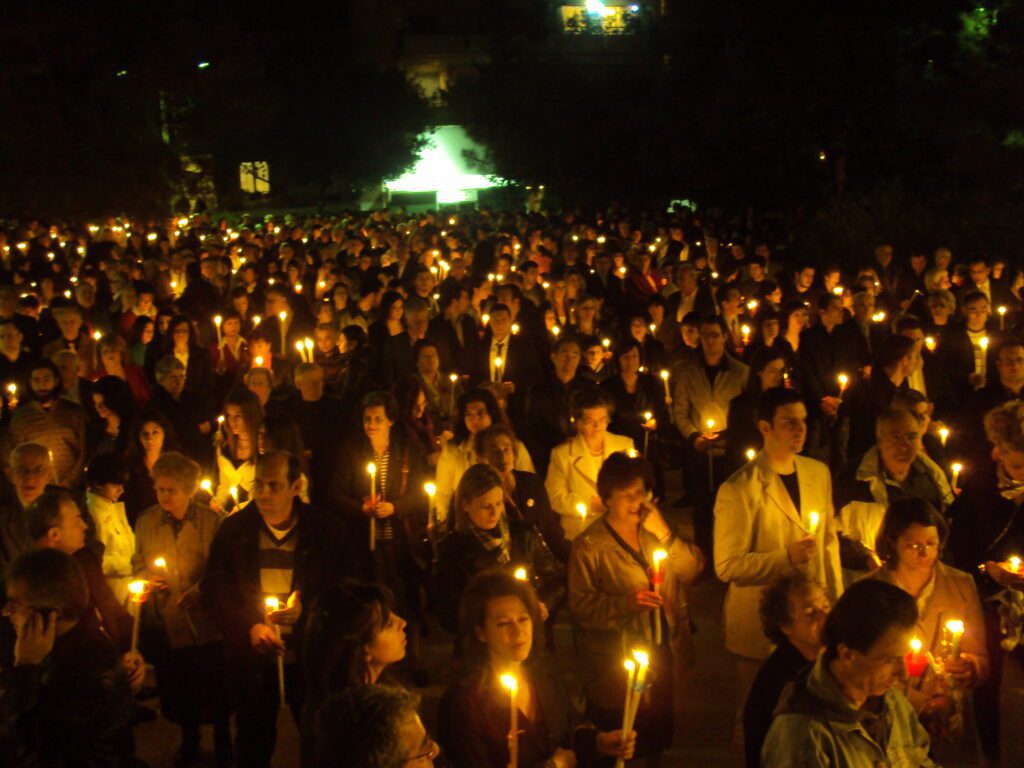
The lighting of the flames is the signal for celebrations to start and the Lent fast to be broken. The traditional greeting, as fireworks and dynamite explode all around you in the street, is Khristós Anésti (“Christ is risen”), to which the response is Alithós Anésti (“Truly He is risen”). On Easter Sunday there’s feasting on roast lamb. The Greek equivalent of Easter eggs is hard-boiled eggs (painted red on Holy Thursday), which are baked into twisted, sweet bread-loaves (tsourékia) or distributed on Easter Sunday. People rap their eggs against their friends’ eggs, and the owner of the last uncracked egg is considered lucky. Read more on Easter in Greece
Public Holidays in Greece
- Agios Vasíleios (1 Jan)
- Independence Day (25 Mar)
- Protomagiá (1 May) Megáli
- Paraskeví (Good Friday)
- Páscha (Easter Sunday)
- Deftéra tou Páscha (Easter Monday)
- Christoúgenna (25 Dec)
- Sýnaxis tis Theotókou (26 Dec)
Calendar of Events in Greece
January
Feast of St. Basil (Ayios Vassilios). St. Basil is the Greek equivalent of Santa Claus. The holiday is marked by the exchange of gifts and a special cake, vassilopita, made with a coin in it; the person who gets the piece with the coin will have good luck. January 1.
Epiphany (Baptism of Christ). Baptismal fonts and water are blessed. A priest may throw a cross into the harbor and young men will try to recover it; the finder wins a special blessing. Children, who have been kept good during Christmas with threats of the kalikantzari (goblins), are allowed on the 12th day to help chase them away. January 6.
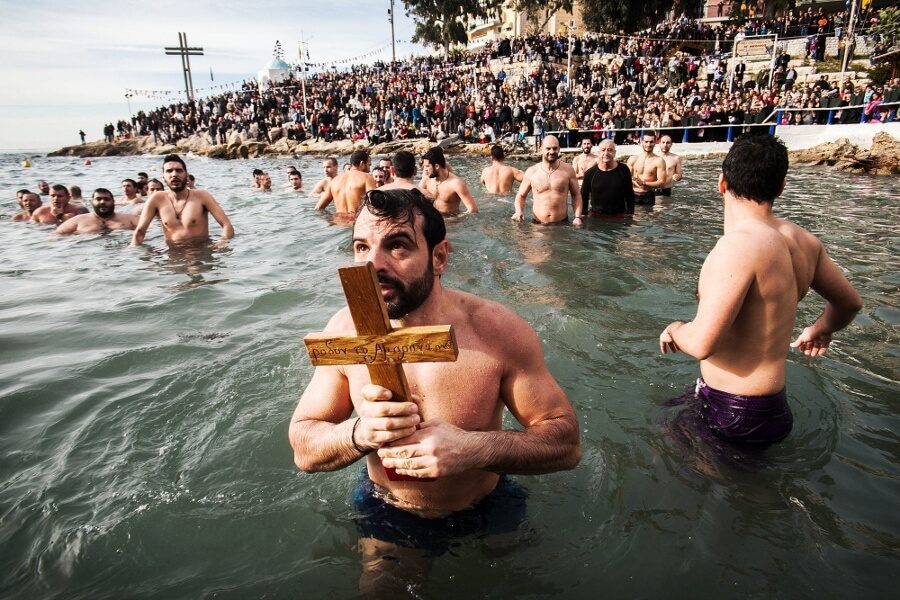
February
Carnival (Karnavali). Be ready for parades, marching bands, costumes, drinking, dancing, and general loosening of inhibitions, depending on the locale. Some scholars say the name comes from the Latin for “farewell meat,” while others hold that it comes from “car naval,” the chariots celebrating the ancient sea god Poseidon (Saturn, to the Romans). The city of Patras shows its support of the latter theory with its famous chariot parade and wild Saturnalia, private parties, and public celebrations. Masked revels are widely held in Macedonia. On the island of Skyros, the pagan “goat dance” is performed, reminding us of the primitive Dionysiac nature of the festivities. Crete has its own colorful versions, whereas in the Ionian Islands, festivities are more Italian. In Athens, people bop each other on their heads with plastic hammers. Celebrations last the 3 weeks before the beginning of Lent.
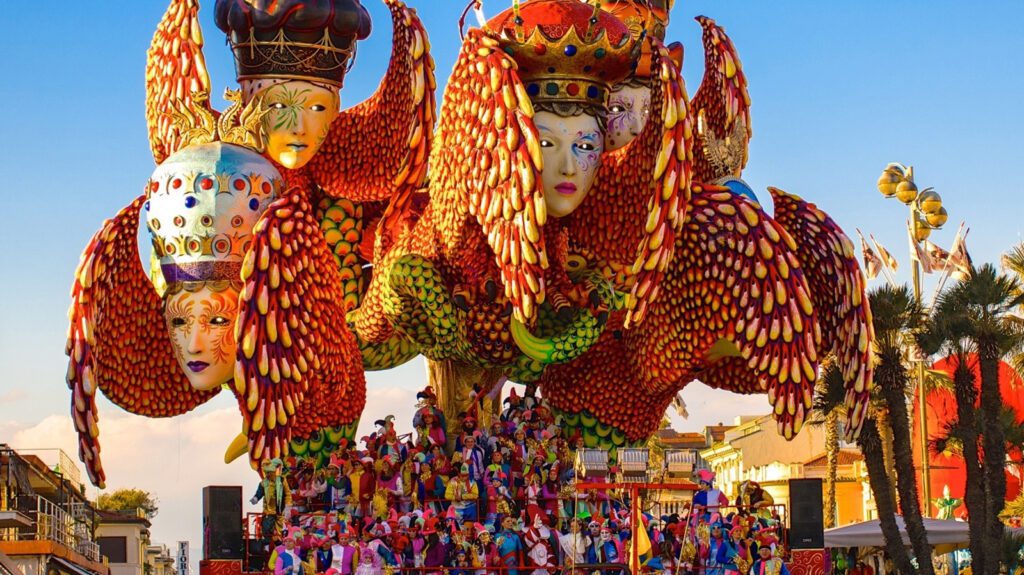
March
Independence Day and the Feast of the Annunciation. The two holidays are celebrated simultaneously with military parades, especially in Athens. The religious celebration is particularly important on the islands of Tinos and Hydra and in churches or monasteries named Evangelismos (Bringer of Good News) or Evangelistria (the feminine form of the name). March 25.The religious festival, one of the most important for the Orthodox Church, marks the Angel Gabriel’s announcement to the Virgin Mary that she was to become the Holy Mother.
April
Feast of St. George (Ayios Yioryios). The feast day of the patron saint of shepherds is an important rural celebration with dancing and feasting. Arachova, near Delphi, is famous for its festivities. The island of Skyros also gives its patron saint a big party on April 23. (If the 23rd comes before Easter, the celebration is postponed until the Mon after Easter.)
Orthodox Easter and Holy Week: The Greek calendar revolves around religious holidays. Orthodox Easter (Pascha)—usually a week later than Western Easter, and the only holiday calculated according to the Julian calendar—is the nation’s biggest. Most of the native population—97% of whom are Greek Orthodox—observe the traditions. Most people who did not fast for the 40 days of Lent begin fasting during Holy Week, which starts on the Monday before Easter. On Holy Tuesday, devotees whitewash their houses and walkways. On Wednesday, they bring holy oil home from church and use it, along with sprigs of basil, to bless the households. On Holy Thursday, they receive Communion, and priests in special dress read biblical accounts of the Last Supper during an all-night vigil. At home, followers boil eggs and dye them red to symbolize the blood of Christ and rebirth. Many also bake Easter bread (tsoureki) and biscuits (koulourakia). Church bells solemnly toll on Good Friday, and at around 8pm, a candlelit procession through the parish accompanies a decorated funeral bier (epitaphios) of Christ. On Saturday, they attempt to scare away any remaining bad spirits that might hinder the Resurrection (Anastasi). Most people go to their neighborhood church just before midnight with candles (lambades); the children carry lavishly decorated ones, often received as traditional gifts from their godparents. The lights of the church are dimmed at midnight, symbolizing Christ’s death. The priest then brings out the holy flame, brought from Jerusalem for the occasion, and passes it to church members, who light one another’s candles while saying “Christos anesti” (“Christ is risen”). Youths light fireworks, and congregants return home with their lit candles and bless their homes by “drawing” a cross on the doorframe with the candle’s smoke. On Easter Sunday, they break the Lenten fast by cracking the eggs and eating magiritsa soup, made with dill, rice, avgolemono (egg-lemon) sauce, and the innards of Sunday’s roast lamb. Easter Sunday brings much feasting, drinking, and dancing, as the smell of lamb permeates the air from roof-terrace spit-roasts. At church, passages on the Resurrection are read in many languages, symbolizing world unity. Easter Monday is a national holiday.
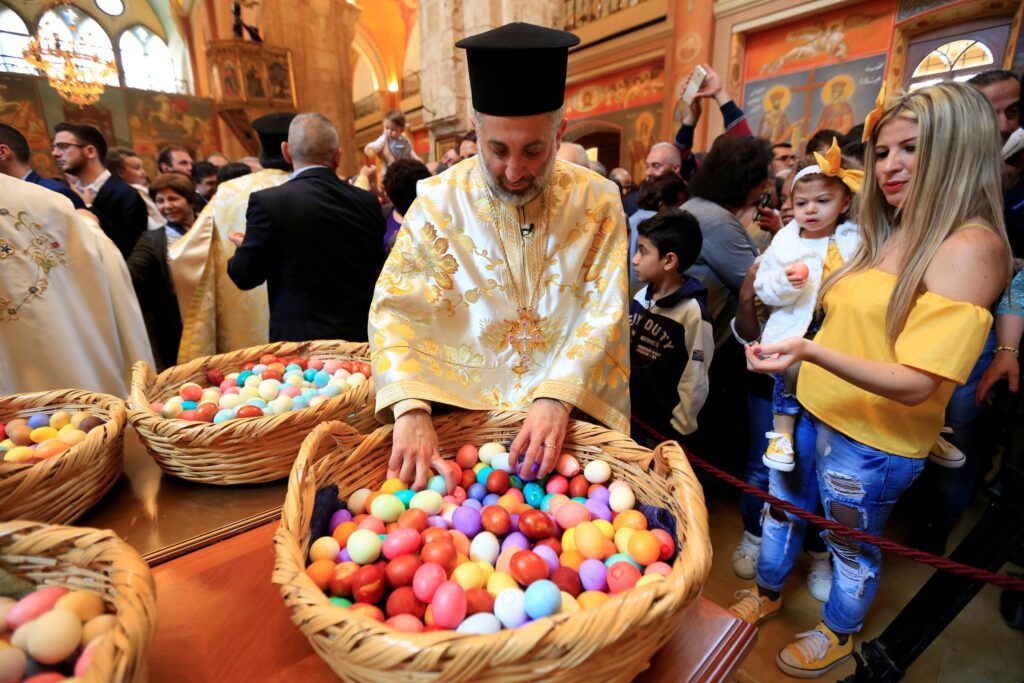
The Good Friday exodus from Athens is amazing, and you can remain and enjoy the deserted city or, if you’re fortunate and have made reservations, because Greeks take up most of the travel facilities, you can be among the celebrants in any town or village. Dancing takes place, often in traditional costumes. In a unique celebration on Patmos, the Last Supper is reenacted at the Monastery of St. John the Divine. Tip: Tourists must dress appropriately during this special time. Shorts, miniskirts, and sleeveless shirts will not only offend Greeks, but will prohibit your entry to religious sites.
May
May Day. On this urban holiday, families have picnics in the country and pick wildflowers, which are woven into wreaths and hung from balconies and over doorways. May Day is still celebrated by Greek communists and socialists as a working-class holiday. May 1.Traditionally, families go to the countryside and pick wild flowers, which are made into wreaths with garlic. These are then hung on doors, balconies, fishing boats and even car bonnets to ward off evil. In major towns and cities across the country, there are also parades and workers’ rallies to mark Labour Day, usually led by the Communist Party.
Hippocratic Oath. Ritual recitations of the oath by the citizens of Kos honor their favorite son, Hippocrates. Young girls in ancient dress, playing flutes, accompany a young boy in procession until he stops and recites in Greek the timeless oath of physicians everywhere. May through September.
Feast of St. Constantine (Ayios Konstandinos). The first Orthodox emperor, Constantine, and his mother, St. Helen (Ayia Eleni), are honored, most interestingly, by fire-walking rituals (anastenaria) in four villages in Macedonian Greece: Ayia Eleni, Ayios Petros, Langada, and Meliki. It’s a big party night for everyone named Costa and Eleni. (Name days, rather than birthdays, are celebrated in Greece.) The anniversary of the Ionian reunion with Greece is also celebrated, mainly in Corfu. May 21.
Anastenaria is a traditional barefoot fire-walking ritual with ecstatic dance performed in some villages in Northern Greece and Southern Bulgaria. The communities which celebrate this ritual are descended from refugees who entered Greece from Eastern Thrace following the Balkan Wars of 1911–12 and the Population exchange between Greece and Turkey in 1923. The Bulgarian and Greek villages perform a unique annual ritual cycle, which begins on May 21 and ends on May 23 every year. The central figures of the tradition are Saint Constantine and Saint Helen, but all the significant days in this cycle coincide with important days in the Greek Orthodox calendar and are related to various Christian saints.
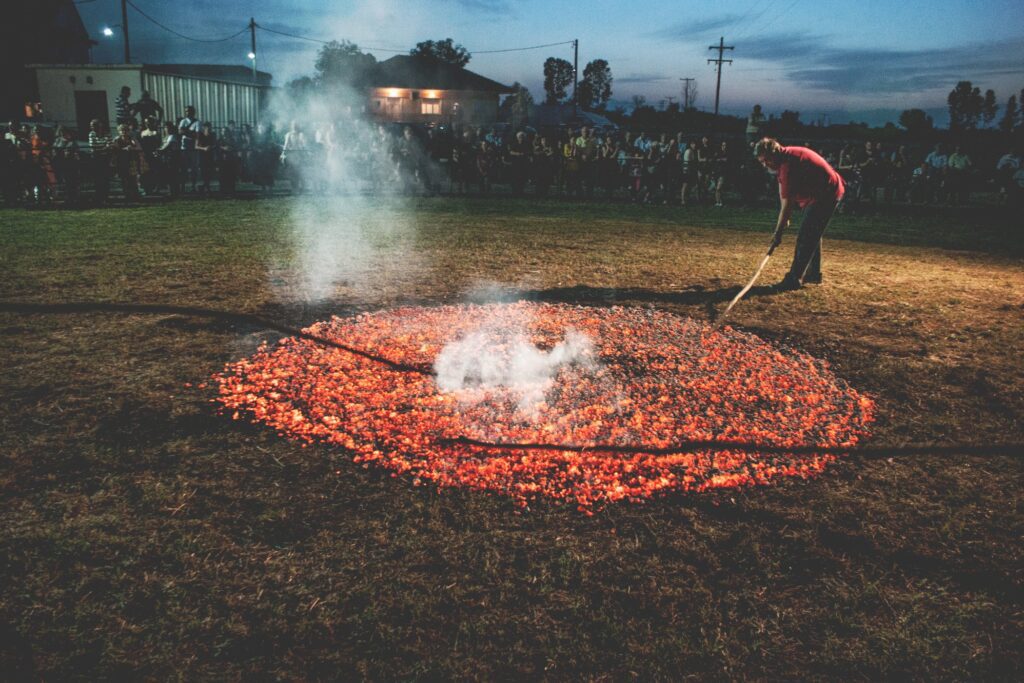
Análipsi, Ascension (40 days after Easter; usually late May). This is another important religious feast day.
June
Athens Festival. Featured are superb productions of ancient drama, opera, orchestra performances, ballet, modern dance, and popular entertainers. The festival takes place in the handsome Odeum of Herodes Atticus, on the southwest side of the Acropolis. June to early October.
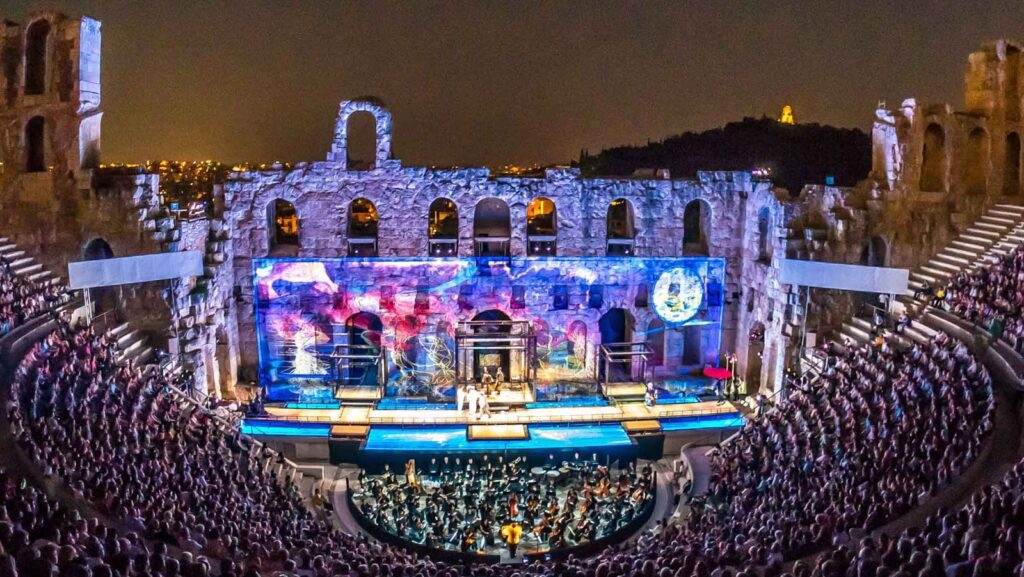
Folk-Dance Performances. The site of these performances is the theater in the Old Town of Rhodes.
Wine Festival. This festival is held annually at Daphni, about 10km (7 miles) west of Athens; wine festivals are also held on Rhodes and elsewhere.
Simi Festival. The 4-month feast features concerts, theater, storytelling, and dance, starring acclaimed Greek and international artists. With its epicenter on the tiny island of Simi, the events spill over onto seven neighboring islands: Astypalea, Halki, Kastellorizo, Karpathos, Kassos, Nissiros, and Tilos. June through September.
Lycabettus Theater. A variety of performances are presented at the amphitheater on Mount Likavitos (Lycabettus) overlooking Athens. Mid-June to late August.
Miaoulia. This celebration on Hydra honors Hydriot Admiral Miaoulis, who set much of the Turkish fleet on fire by ramming it with explosives-filled fireboats. Weekend in mid-June.
Aegean Festival. In the harbor of Skiathos town, the Bourtzi Cultural Center presents ancient drama, modern dance, folk music and folk dance, concerts, and art exhibits. June through September.
International Classical Musical Festival. This annual festival takes place at Nafplion, in the Peloponnese. One week in June or July.
Midsummer Eve. The now-dried wreaths of flowers picked on May Day are burned to drive away witches, in a version of pagan ceremonies now associated with the birth of John the Baptist on June 24, Midsummer Day. June 23 to June 24.
Navy Week. The celebration takes place throughout Greece. In Volos, the voyage of the Argonauts is reenacted. On Hydra, the exploits of Adm. Andreas Miaoulis, naval hero of the War of Independence, are celebrated. Fishermen at Plomari on Lesvos stage a festival. End of June and beginning of July.
July
Puppet Festival. Hydra’s annual festival has drawn puppeteers from countries as far away as Togo and Brazil. Early July.
Dodoni Festival. Classical dramas are presented at the ancient theater of Dodoni, south of Ioannina. For information, call tel. 26510/20-090. July through September.
Epidaurus Festival. Performances of classical Greek drama take place in the famous amphitheater. For information, contact the Greek Festival Office, 4 Stadiou (tel. 210/322-1459 or 210/322-3111 to -3119, ext. 137). July to early September.
International Folklore Festival. At Naoussa, in northern Greece, both amateur and professional dance companies gather from all over the world. For information, call tel. 23320/20-211 or e-mail [email protected]. July.
Northern Greece National Theater. Classical drama is performed in the amphitheaters in Phillipi and on the island of Thasos. You will be able to see these productions without the hassles of Athens performances. For information, call tel. 2510/223-504. July and August.
Hippokrateia Festival. Art, music, and theater come to the medieval castle of the Knights of St. John, in the main harbor of Kos. July and August.
Dionysia Wine Festival. This is not a major event, but it’s fun if you happen to find yourself on the island of Naxos. For information, call tel. 22850/22-923. Mid-July.

Wine Festival at Rethymnon, Crete. Rethymnon hosts a wine festival as well as a Renaissance Festival. There are now wine festivals and arts festivals all over Greece, but among the more engaging are those held in Rethymnon. Sample the wines, then sample the Renaissance theatrical and musical performances. Mid-July to early September.
Feast of Ayia Marina. The feast of the protector of crops is widely celebrated in rural areas. July 17.
Feast of the Prophet Elijah (Profitis Elias). The prophet’s feast day is celebrated in the hilltop shrines formerly sacred to the sun god Helios. The most famous shrine is on Mount Taygetos, near Sparta. July 18 to July 20.
August
Feast of the Transfiguration (Metamorphosi). This feast day is observed in the numerous churches and monasteries of that name, though they aren’t much for parties. August 6.
Aeschylia Festival of Ancient Drama. Classical dramas are staged at the archaeological site of Eleusis, home of the ancient Mysteries and birthplace of Aeschylus, west of Athens. August to mid-September.
The Aegina Music Festival takes place across the island in August; information from (tel. 698/131-9332).
Feast of the Assumption of the Virgin (Apokimisis tis Panayias). On this important day of religious pilgrimage, many come home to visit, so rooms are particularly hard to find. The holiday reaches monumental proportions in Tinos; thousands of people descend on the small port town to participate in an all-night vigil at the cathedral of Panagia Evangelistria, in the procession of the town’s miraculous icon, and in the requiem for the soldiers who died aboard the Greek battleship Elli on this day in 1940. August 15.
Epirotika Festival. Ioannina presents theatrical performances, concerts, and exhibitions. August to early September.
Olympus Festival. Cultural events take place in several sites around Mount Olympus, in particular at the ancient theater of Dion and in the Venetian castle of Platamonas. Throughout August.
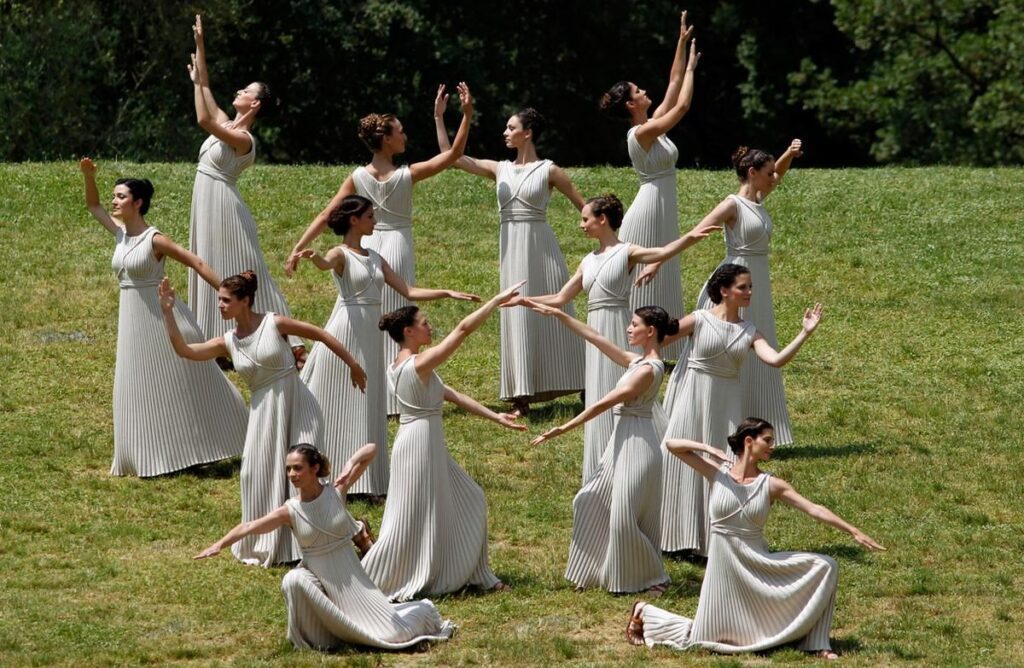
September
Feast of the Birth of the Virgin (Yenisis tis Panayias). Another major festival, especially on Spetses, the anniversary of the Battle of the Straits of Spetses is celebrated on the weekend closest to September 8 with a reenactment in the harbor, fireworks, and an all-night bash.
Feast of the Exaltation of the Cross (Ipsosi to Stavrou). This marks the end of summer’s stretch of feasts, and even Stavros has had enough for a while. September 14.
Thessaloniki Film Festival and Festival of Popular Song. That lively and sophisticated city continues to live it up. End of September. Held every year in November, the Thessaloniki International Film Festival is one of the grandest cinematographic events in Greece. For over 50 years, the festival showcases work by emerging talent from Greece and beyond and welcomes over 70,000 people attending the screenings held around the city.

Aegina honors its famous nut, the pistachio, with the Pistachio Festival every September.
October
Feast of St. Demetrius (Ayios Dimitrios). Particularly important in Thessaloniki, where he is the patron saint, the Demetrius Festival features music, opera, and ballet. New wine is traditionally untapped. October 26.

Ochi Day. General Metaxa’s negative reply (ochi is Greek for no) to Mussolini’s demands in 1940 conveniently extends the feast-day party with patriotic outpourings, including parades, folk music and folk dancing, and general festivity. October 28.
November
Feast of the Archangels Gabriel and Michael (Gavriel and Mihail). Ceremonies are held in the many churches named for the two archangels. November 8.
Feast of St. Andrew (Ayios Andreas). The patron saint of Patras provides another reason for a party in this swinging city. November 30.
December
Feast of St. Nikolaos (Ayios Nikolaos). This St. Nick is the patron saint of sailors. Numerous processions head down to the sea and to the many chapels dedicated to him. December 6.
Christmas. The day after Christmas honors the Gathering Around the Holy Family (Synaksis tis Panayias). December 25 and 26.
New Year’s Eve. Children sing Christmas carols (kalanda) outdoors while their elders play cards, talk, smoke, eat, and imbibe. December 31.
Note: This information was accurate when it was published, but can change without notice. Please be sure to confirm all rates and details directly with the companies in question before planning your trip.

